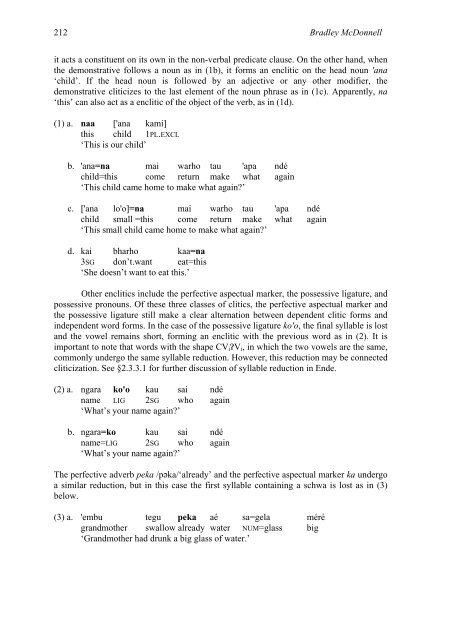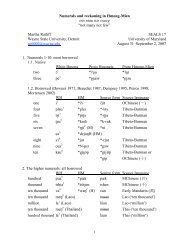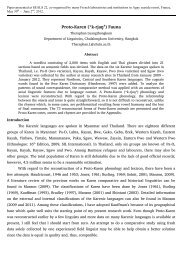proto-southwestern-tai revised: a new reconstruction - seals 22
proto-southwestern-tai revised: a new reconstruction - seals 22
proto-southwestern-tai revised: a new reconstruction - seals 22
You also want an ePaper? Increase the reach of your titles
YUMPU automatically turns print PDFs into web optimized ePapers that Google loves.
212 Bradley McDonnell<br />
it acts a constituent on its own in the non-verbal predicate clause. On the other hand, when<br />
the demonstrative follows a noun as in (1b), it forms an enclitic on the head noun 'ana<br />
‘child’. If the head noun is followed by an adjective or any other modifier, the<br />
demonstrative cliticizes to the last element of the noun phrase as in (1c). Apparently, na<br />
‘this’ can also act as a enclitic of the object of the verb, as in (1d).<br />
(1) a. naa ['ana kami]<br />
this child 1PL.EXCL<br />
‘This is our child’<br />
b. 'ana=na mai warho tau 'apa ndé<br />
child=this come return make what again<br />
‘This child came home to make what again?’<br />
c. ['ana lo'o]=na mai warho tau 'apa ndé<br />
child small =this come return make what again<br />
‘This small child came home to make what again?’<br />
d. kai bharho kaa=na<br />
3SG don’t.want eat=this<br />
‘She doesn’t want to eat this.’<br />
Other enclitics include the perfective aspectual marker, the possessive ligature, and<br />
possessive pronouns. Of these three classes of clitics, the perfective aspectual marker and<br />
the possessive ligature still make a clear alternation between dependent clitic forms and<br />
independent word forms. In the case of the possessive ligature ko'o, the final syllable is lost<br />
and the vowel remains short, forming an enclitic with the previous word as in (2). It is<br />
important to note that words with the shape CViɁVi, in which the two vowels are the same,<br />
commonly undergo the same syllable reduction. However, this reduction may be connected<br />
cliticization. See §2.3.3.1 for further discussion of syllable reduction in Ende.<br />
(2) a. ngara ko'o kau sai ndé<br />
name LIG 2SG who again<br />
‘What’s your name again?’<br />
b. ngara=ko kau sai ndé<br />
name=LIG 2SG who again<br />
‘What’s your name again?’<br />
The perfective adverb peka /p�ka/‘already’ and the perfective aspectual marker ka undergo<br />
a similar reduction, but in this case the first syllable con<strong>tai</strong>ning a schwa is lost as in (3)<br />
below.<br />
(3) a. 'embu tegu peka aé sa=gela méré<br />
grandmother swallow already water NUM=glass big<br />
‘Grandmother had drunk a big glass of water.’





